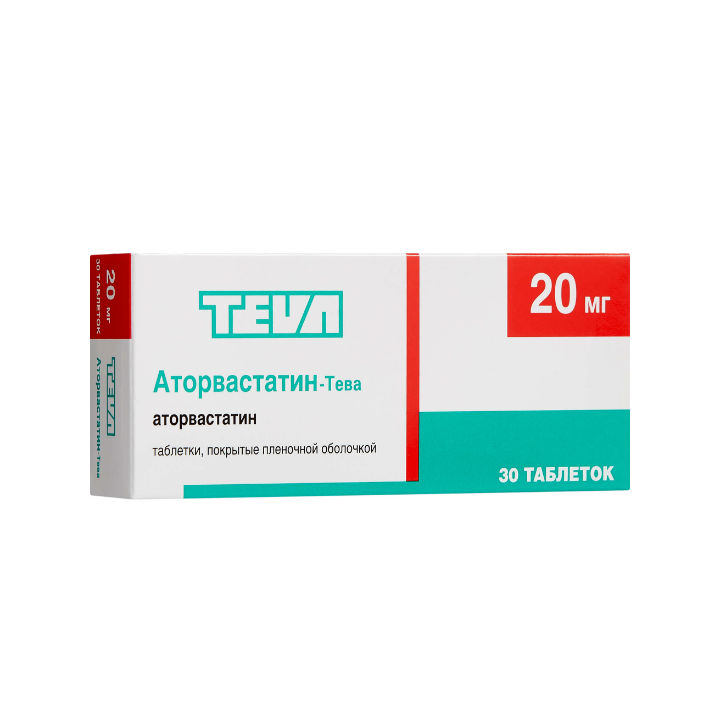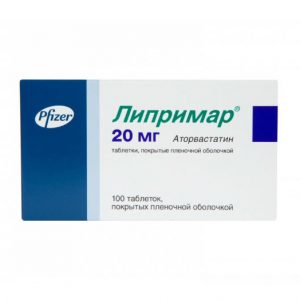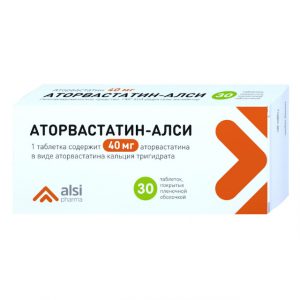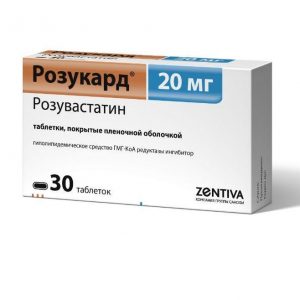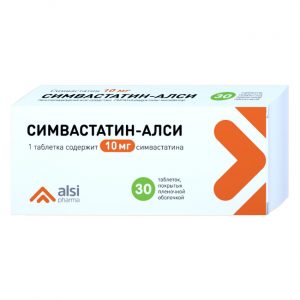Description
release
tablets, film-coated
Packing
30 tablets.
Pharmacological action of
Atorvastatin is a selective competitive inhibitor of HMG-CoA reductase, an enzyme that determines the ultimate rate of cholesterol biosynthesis, which is responsible for the conversion of 3-hydroxy-3-methyl-glutaryl-coenzyme A to mevalonate, including the sterol precursor. In the liver, triglycerides and cholesterol are included in the composition of very low density lipoproteins (VLDL), enter the blood plasma and are transported to peripheral tissues. Low-density lipoproteins (LDL) are formed from VLDL, which are catabolized primarily through interaction with high-affinity LDL receptors.
Atorvastatin reduces plasma cholesterol and lipoprotein levels by inhibiting HMG-CoA reductase and the synthesis of cholesterol in the liver, as well as by increasing the number of liver LDL receptors on the cell surface, increasing LDL uptake and catabolism.
Atorvastatin reduces LDL production and LDL particle count. Atorvastatin causes a pronounced and persistent increase in the activity of LDL receptors in combination with favorable changes in the quality of circulating LDL particles.
Dose-dependently lowers LDL levels in patients with homozygous hereditary hypercholesterolemia resistant to therapy with other hypolipidemic agents. Studies of the dose / effect ratio showed that atorvastatin lowers total cholesterol (by 30-46%), LDL cholesterol (by 41-61%), apolipoprotein B (by 34-50%) and triglycerides (by 14-33%), while simultaneously causing, to one degree or another, an increase in HDL cholesterol and apolipoprotein A. These results were similar in patients with heterozygous familial hypercholesterolemia, non-family forms of hypercholesterolemia and mixed hyperlipidemia, including patients with non-insulin-dependent diabetes mellitus.
Due to the decrease in the level of total cholesterol, LDL cholesterol and apolipoprotein B, the risk of cardiovascular disease is reduced and, accordingly, the risk of death is reduced. Studies of the effects of atorvastatin on cardiovascular morbidity and mortality have not yet been completed.
When using the drug in elderly patients, there were no differences in safety, efficacy, or achievement of lipid-lowering therapy goals in comparison with the general population.
Indications
Primary hypercholesterolemia with diet therapy failure, combined hypercholesterolemia and hypertriglyceridemia, heterozygous and homozygous familial hypercholesterolemia with diet therapy failure.
Contraindications
Active liver disease, increased activity of serum transaminases by more than 3 times of unknown origin, pregnancy, lactation (breastfeeding), and increased sensitivity to atorvastatin. Women of reproductive age who do not use reliable contraceptives. Atorvastatin Teva is contraindicated in pregnancy and lactation (breastfeeding).
Pregnancy and lactation
It is not known whether atorvastatin is excreted in breast milk. Given the possibility of adverse events in infants, if necessary, use of the drug during lactation should decide on the termination of breastfeeding. Women of reproductive age should use adequate methods of contraception during treatment. Atorvastatin Teva can be prescribed to women of reproductive age only if they have a very low probability of pregnancy and the patient is informed about the possible risk of treatment for the fetus.
Composition
1 film-coated tablet contains: active ingredient: atorvastatin calcium (in terms of atorvastatin) 20.72 mg (20 mg).
excipients: lactose monohydrate, povidone, Eudragit E 100 (butyl methacrylate, dimethylaminoethyl methacrylate and methyl methacrylate copolymer 1: 2: 1), alpha-tocopherol macrogol succinate, croscarmellose sodium 700, sodium stearylfumarate 3-nitro-3-octarate 10-di-tetra-di-1-oparad, 3-nitrate, Opard diarrheum (E464), hypromellose 2910 5cP (E464), macrogol 400, polysorbate 80).
Dosage and administration
The treatment is carried out against a standard diet for patients with hypercholesterolemia. The dose of Atorvastatin Teva is set individually, depending on the initial cholesterol level. It is taken orally. The initial dose is usually 10 mg Once a day, the effect manifests itself within 2 weeks, and the maximum effect – within 4 weeks. If necessary, the dose can be gradually increased with an interval of 4 weeks or more. The maximum daily dose of Atorvastatin Teva is 80 mg.
Drug interactions
The risk of myopathy during treatment with other drugs with statin derivatives is increased with the simultaneous use of cyclosporine, fibrates, erythromycin, azole antifungals, and nicotinic acid. With the simultaneous administration of Atorvastatin Teva and a suspension containing magnesium hydroxide and aluminum hydroxide, the concentration of atorvastatin in the blood plasma decreased by about 35%, however, the degree of decrease in LDL-C level did not change. With the simultaneous use of Atorvastatin Teva does not affect the pharmacokinetics of antipyrine (phenazone), therefore, interaction with other drugs metabolized by the same isoenzymes of the P450 cytochrome system is not expected.
Overdose
Treatment: No specific antidote, symptomatic therapy is performed. Hemodialysis is ineffective.
Storage Conditions
In a dark place at a temperature not exceeding 25 ° C.
Shelf life
2 years.
Deystvuyushtee substance
Atorvastatin
Terms of drugstore
prescription
dosage form
tablets
Prescribing
Prescribing
For adults as prescribed by a doctor
Teva Pharmaceutical Enterprise Co., Ltd., Israel
